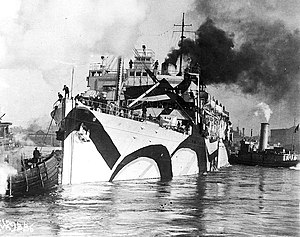 USS Orizaba (ID–1536) departing New York via the North River for France in World War I (1918)
| |
| History | |
|---|---|
| Name | USS Orizaba (ID-1536) |
| Namesake | Orizaba, Veracruz, Mexico |
| Builder | William Cramp & Sons, Philadelphia |
| Yard number | 435 |
| Launched | 26 February 1917 as Orizaba |
| Acquired | 11 April 1918 |
| Commissioned | 27 May 1918 |
| Decommissioned | 4 September 1919 |
| In service | after 4 September 1919 as USAT Orizaba |
| Out of service | 1920 |
| Fate | returned to Ward Line, 1920 |
| Name | SS Orizaba |
| Owner | Ward Line |
| Acquired | 1920 |
| Port of registry | |
| In service | 1920 |
| Refit | 1924 |
| Identification | |
| Route |
|
| Out of service | 1939 |
| Fate |
|
| Acquired | early 1941, by War Department |
| In service | early 1941 |
| Out of service | March 1941 |
| Refit | April–May 1941, Bethlehem Steel Co. |
| Acquired | 4 June 1941, by US Navy |
| Commissioned | 15 June 1941 |
| Decommissioned | 23 April 1945 |
| Stricken | 20 July 1953 |
| Identification | Call sign: NUBY[1] |
| Honors and awards | 1 battle star, World War II |
| Fate |
|
| Name | Duque de Caxias (U11) |
| Namesake | Luís Alves de Lima e Silva, Duke of Caxias |
| Acquired | 16 July 1945 |
| Commissioned | 16 July 1945 |
| Decommissioned | 13 April 1959 |
| Stricken | 1960 |
| Fate | Scrapped in 1963 |
| General characteristics | |
| Tonnage | 6,937 gross tons (as USAT Orizaba)[2] |
| Displacement | 11,293 tons (as USS Orizaba) |
| Length | 443 ft 3 in (135.10 m) |
| Beam | 60 ft (18.3 m) |
| Draft | 24 ft 4 in (7.42 m) |
| Depth | 15 ft 7 in (4.75 m) |
| Installed power | 4 steam turbines |
| Propulsion | 2 screw propellers |
| Speed | 16.5 knots (30.6 km/h) |
| Range | 6,200 nautical miles (11,500 km)[2] |
| Capacity | 35,455 cubic feet (1,004.0 m3),[2] of which 13,107 cubic feet (371.1 m3) refrigerated |
| Troops | |
| Complement | 323 officers and enlisted |
| Armament |
|
USS Orizaba (ID-1536/AP-24) was a transport ship for the United States Navy in both World War I and World War II. She was the sister ship of Siboney but the two were not part of a ship class. In her varied career, she was also known as USAT Orizaba in service for the United States Army, and as SS Orizaba in interwar civilian service for the Ward Line, and as Duque de Caxias (U-11) as an auxiliary in the Brazilian Navy after World War II.
Orizaba made 15 transatlantic voyages for the navy carrying troops to and from Europe in World War I with the second-shortest average in-port turnaround time of all navy transports. The ship was turned over to the War Department in 1919 for use as army transport USAT Orizaba. After her service in World War I ended, Orizaba reverted to the Ward Line, her previous owners. The ship was briefly engaged in transatlantic service to Spain and then engaged in New York–Cuba–Mexico service until 1939, when the ship was chartered to United States Lines. While Orizaba was in her Ward Line service, American poet Hart Crane leapt to his death from the rear deck of the liner off Florida in April 1932.
In World War II the ship was requisitioned by the War Shipping Administration and again assigned to the War Department as USAT Orizaba. After completing one voyage as an Army transport, the ship was transferred to the U.S. Navy, where she was re-commissioned as USS Orizaba (AP-24). The ship made several transatlantic runs, was damaged in an air attack in the Allied invasion of Sicily, and made trips to South America. The transport also served in the Pacific Theatre, making several transpacific voyages, and one to the Aleutians.
In June 1945, Orizaba was transferred under Lend-Lease to the Brazilian Navy where she served as Duque de Caxias (U-11). In August 1945, Duque de Caxis carried parts of the Brazilian Expeditionary Force from Naples back to Rio de Janeiro. The ship was badly damaged by a fire in 1947, but was repaired and remained in service. Permanently transferred to Brazil in 1953, Duque de Caxias was decommissioned in 1959 and scrapped in 1963.
